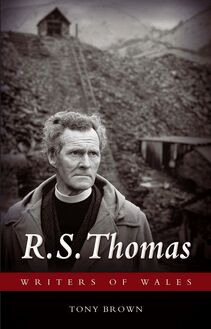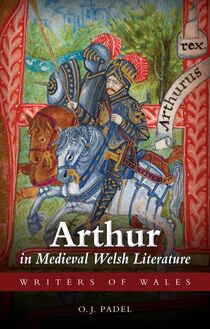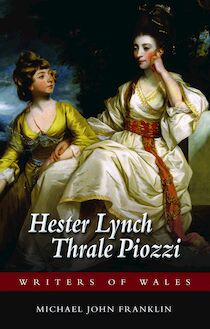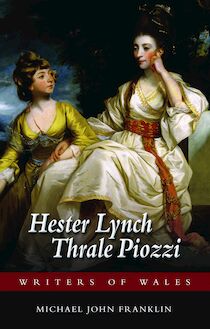Welsh Periodicals in English 1882-2012 , livre ebook
105
pages
English
Ebooks
2013
Vous pourrez modifier la taille du texte de cet ouvrage
Obtenez un accès à la bibliothèque pour le consulter en ligne En savoir plus
Découvre YouScribe en t'inscrivant gratuitement
Découvre YouScribe en t'inscrivant gratuitement
105
pages
English
Ebooks
2013
Vous pourrez modifier la taille du texte de cet ouvrage
Obtenez un accès à la bibliothèque pour le consulter en ligne En savoir plus
Publié par
Date de parution
15 juin 2013
Nombre de lectures
3
EAN13
9781783165612
Langue
English
Poids de l'ouvrage
2 Mo
Welsh Periodicals in English celebrates the contribution of English-language periodicals to the careers of Welsh writers (from Lewis Morris to Owen Sheers) and to the practice of their editors (from Charles Wilkins (1882) to Emily Trahair (2012)). These periodicals have helped to create an active Anglophone public sphere in Wales and continue to stimulate discussion on a wide range of topics: tensions between tradition and continuity; the role of magazines in developing new writers; gender issues; relations with Welsh-language journals; the involvement of the periodicals in social and political issues, and their contribution to cultural developments in Wales. A detailed study of the design, content and editorial practice of the periodicals is illuminated by discussions with living editors, and the book concludes with a discussion on the strengths and weaknesses of contemporary productions and a comparison with their successful equivalents in Ireland.
Publié par
Date de parution
15 juin 2013
Nombre de lectures
3
EAN13
9781783165612
Langue
English
Poids de l'ouvrage
2 Mo
Writers of Wales
Welsh Periodicals in English
Editors:
Meic Stephens
Jane Aaron
M.Wynn Thomas
Honorary Series Editor:
R. Brinley Jones
Other titles in the Writers of Wales series:
Ruth Bidgood (2012), Matthew Jarvis
Dorothy Edwards (2011), Claire Flay
Kate Roberts (2011), Katie Gramich
Geoffrey of Monmouth (2010), Karen Jankulak
Herbert Williams (2010), Phil Carradice
Rhys Davies (2009), Huw Osborne
R. S. Thomas (2006), Tony Brown
Ben Bowen (2003), T. Robin Chapman
James Kitchener Davies (2002), M. Wynn Thomas
Writers of Wales
Welsh Periodicals in English 1882–2012
Malcolm Ballin
© Malcolm Ballin, 2013
All rights reserved. No part of this book may be reproduced in any material form (including photocopying or storing it in any medium by electronic means and whether or not transiently or incidentally to some other use of this publication) without the written permission of the copyright owner except in accordance with the provisions of the Copyright, Designs and Patents Act 1988. Applications for the copyright owner’s written permission to reproduce any part of this publication should be addressed to the University of Wales Press, 10 Columbus Walk, Brigantine Place, Cardiff CF10 4UP.
www.uwp.co.uk
British Library Cataloguing-in-Publication Data A catalogue record for this book is available from the British Library
ISBN 978-0-7083-2614-5 e-ISBN 978-1-78316-561-2
The right of Malcolm Ballin to be identified as author of this work has been asserted by him in accordance with sections 77, 78 and 79 of the Copyright, Designs and Patents Act 1988.
The publisher acknowledges the financial support of the Welsh Books Council .
Cover image: Olwen Fowler / Shutterstock (jocic)
This book is dedicated to all the editors of and contributors to Welsh periodicals in English, past, present and future
Contents
List of Illustrations
Acknowledgements and Permissions
Introduction: ‘The New Old; Old New’
1 The Liberal Miscellanies: 1882–1914
2 The Independent Periodicals: 1914–1969
3 The Late Twentieth Century: 1969–2012
4 Conclusion
Notes
Bibliography
List of Illustrations
Wales : ed. Owen M. Edwards, first issue, May 1894
The Welsh Outlook : ed. Thomas Jones, first issue, January 1914
Wales : ed. Keidrych Rhys, first issue, Summer 1937
Poetry Wales : ed. Meic Stephens, first issue, Spring 1965
Mabon : ed. Gwyn Thomas and Alun R. Jones, issue 2
Planet 1 : ed. Ned Thomas, first issue, August 1970
Colour illustrations
Wales: The National Magazine for the Welsh People , ed. J. Hugh Edwards, first issue, May 1911
Wales : ed. Keidrych Rhys, first issue, October 1959
Second Aeon : ed. Peter Finch, issue 14, 1972
The New Welsh Review : ed. Belinda Humfrey, second issue, Autumn 1988
Dock Leaves : ed. Raymond Garlick, first issue, Xmas 1949
The Anglo-Welsh Review (incorporating Dock Leaves ): first issue, Spring 1958
Acknowledgements and Permissions
I have acknowledged in the endnotes the help I have received from a great many people in the production of this study. I list below all those who have given formal permission for work to be quoted.
I wish further to record my special thanks to Meic Stephens, whose original idea this was, and to Sarah Lewis, my commissioning editor at the University of Wales Press for their patience and valuable suggestions. Meic Stephens regularly commented on earlier drafts and generously made available personal papers and copies of periodicals. I thank the Chief Executive, The Arts Council of Wales for permission to quote from Council papers. I also thank all those who gave their time to discuss the project with me at various times, including: Cary Archard, Tony Bianchi, Kirsti Bohata, Tony Brown, Gwen Davies, Jasmine Donahaye, Peter Finch, Peter Foss; Katie Gramich, Kathryn Gray; Belinda Humfrey; Matthew Jarvis, Robert Minhinnick, Tomos Owen, Roseanne Reeves, Francesca Rhydderch; Eva Rhys, Zoë Skoulding, Lucy Thomas, Emily Trahair; Alyce von Rothkirch. All errors surviving, despite this help, remain my own.
Every effort has been made to seek permission for quotations from original work. I acknowledge positive responses from or on behalf of the following editors of periodicals:
From Wales [1937–59]: Eva Rhys on behalf of Keidrych Rhys.
From Dock Leaves and The Anglo-Welsh Review : Iestyn and Angharad Garlick on behalf of Raymond Garlick.
From The Anglo-Welsh Review : Glyn Mathias on behalf of Roland Mathias.
From Poetry Wales : Meic Stephens; Sam Adams; John Powell Ward; Cary Archard; Mike Jenkins; Richard Poole; Paul Henry; Robert Minhinnick; Zoë Skoulding.
From Planet : Jasmine Donahaye, after consultation with all living editors.
From New Welsh Review : Gwen Davies on behalf of living editors; Roseanne Reeves on behalf of Robin Reeves.
I also acknowledge permissions from the following contributors in respect of original work:
From Wales (1937–59): Literature Wales on behalf of Glyn Jones; Carcanet on behalf of Hugh MacDiarmid; Gwyn Morris on behalf of Idris Davies; Eva Rhys on behalf of Keidrych Rhys; Gwen Watkins on behalf of Vernon Watkins; Helen Richards on behalf of Alun Richards.
From Life and Letters To-Day : Gwydion Thomas on behalf of R. S. Thomas ( Stones of the Field 1946: copyright: Kajuna Thomas 2001).
From The Welsh Review : Gwyn Morris on behalf of Idris Davies.
From Dock Leaves : Bobi Jones.
From Poetry Wales : Alison Bielski; Peter Gruffydd; Meic Stephens; Christopher Mills.
From Planet : Iestyn and Angharad Garlick on behalf of Raymond Garlick; Brian Davies.
From The New Welsh Review : Duncan Bush; Gareth Calway.
Wales: The National Magazine for the Welsh People , ed. J. Hugh Edwards, first issue, May 1911
Wales : ed. Keidrych Rhys, first issue, October 1959
Second Aeon : ed. Peter Finch, issue 14, 1972
The New Welsh Review : ed. Belinda Humfrey, second issue, Autumn 1988
Dock Leaves : ed. Raymond Garlick, first issue, Xmas 1949
The Anglo-Welsh Review (incorporating Dock Leaves ): first issue, Spring 1958
Introduction: ‘The New Old; Old New’
Tensions between older ideas of Wales and newer conceptions of the nation, together with contradictions between overlapping traditions of Welshness, Britishness and Englishness, frequently surface in the history of Welsh periodicals written in English. The calls of older traditions compete with the seductions of innovation. Such pressures demonstrate that play of cultural forces which Raymond Williams saw as operating between ‘residual’ elements that, while belonging to the past, are still active, and those ‘emergent’ meanings which are in the process of being created. 1
A sense of stirring unease can be creative and challenging; it survives into the present of literary journalism in Wales. For example, in the closing paragraph of her editorial, ‘Redux’, for Summer 2010, Kathryn Gray puzzles (while considering the nature of the significantly titled New Welsh Review) over the teasing relations between the new, the old, the recycled and the recovered:
As it happens, the new is very often the New Old. Admittedly, the New Old is a hard sell. . . That said, new plays a very big part in my thinking . . . But what puts the new in New Welsh Review is, I believe, a strong commitment to the preoccupations of our writers now, above all. A belief that where the writers lead – or wherever they choose to return – a readership and a criticism will follow or, in the process, even, be created. Hybridity, slant approach, collage . . . Freedom of direction, and openness. Return. It’s not exactly new, that’s true. It’s the New Old. Old New. You’ll find it here. (4–5)
This deliberation about tradition and the challenges to it is often found throughout the story of Welsh periodicals written in English. The continual interplay almost constitutes a separate kind of tradition. Editors worry about whether a new paradigm may be emerging and consider whether their readers are indeed, as Kathryn Gray hopes, ‘following’ or ‘returning’ wherever the journal’s writers are leading. The intimate public sphere which they are addressing – the Anglophone intelligentsia within Wales and aspirants to membership of it – harbours long-held conditioned responses and needs to be gently and persuasively coaxed into absorbing new approaches. M. Wynn Thomas records a structural opposition between ‘the rural and nonconformist’ world of the Welsh-speaker, based in tradition (‘The Old’ or the ‘residual’) and the ‘new industrial south Wales where the hegemonic power of English was very apparent’ (‘The New’ or the ‘emergent’). He observes that the beginnings of Welsh writing in English were marked by conflict and rivalry, and argues that there is a need to develop ‘new subtle ways’ to explore the relations between the resulting ‘liminal or boundary states’. 2 The concept of interlocking ‘counter public spheres’ may illuminate these areas of contention.
The earliest Welsh periodicals in English experienced similar dilemmas when they needed to negotiate stresses with the traditions created by the more prolific and longer-established Welsh-language periodicals. Gwyn A Williams traces the history of periodicals in Welsh back to Y Cylchgrawn Cymraeg , published in Pontypool by Morgan John Rhys, a Baptist Minister, in 1793. 3 But by 1850, ‘dozens of Welsh periodicals had appeared and the language had become the medium of a wealth of cultural activities.’ Moreover the circulation of some of these journals was measured in ‘tens of thousands’. 4 Within these Welsh-language periodicals the bibliographer Huw Walters discerns at least two competing strands, ‘one rooted in the Welsh societies of London and the other in the Methodist and Nonconformist movements in Wales itself’. 5 Denominational magazines like Y Drysorfa (The Treasury), founded in 1830, became ‘legion’, according to Walters, as religious revivals swept the nation. Early London-based Welsh magazines inc














